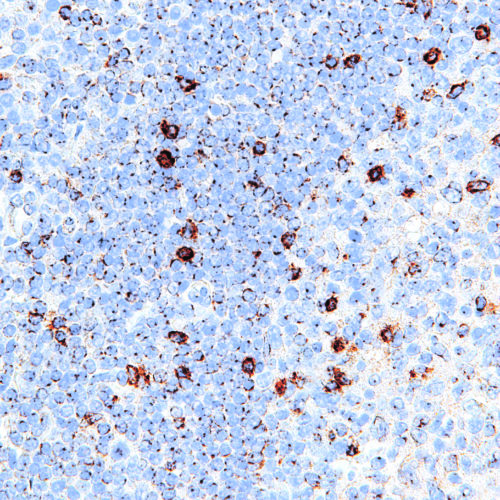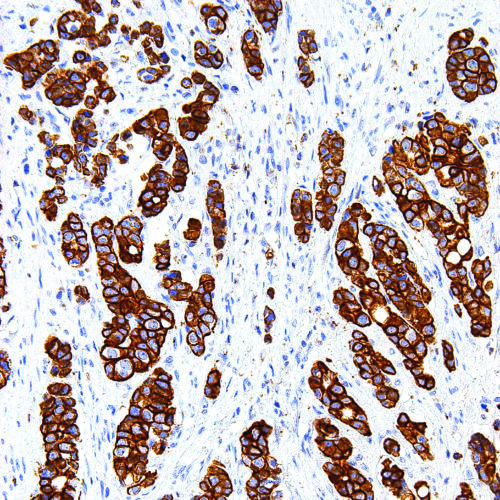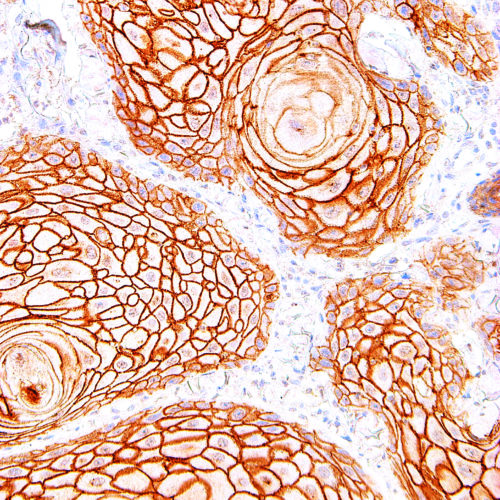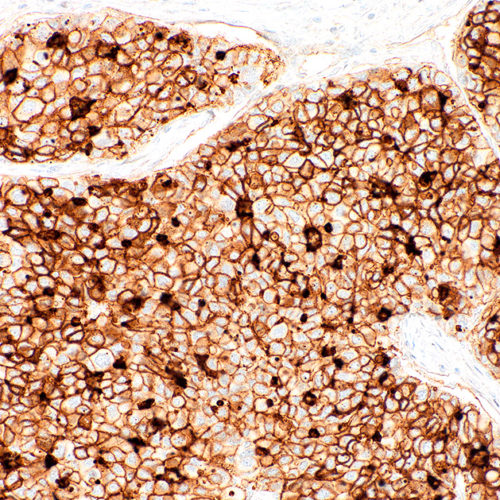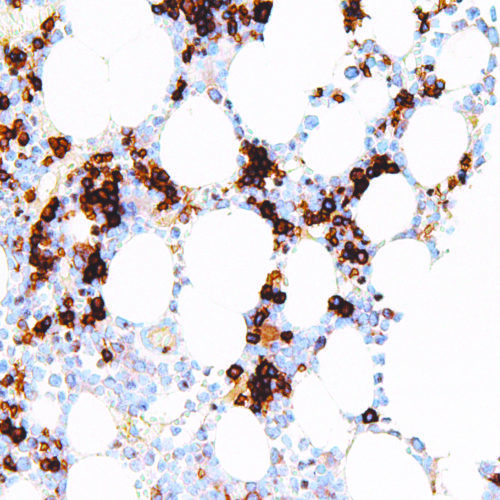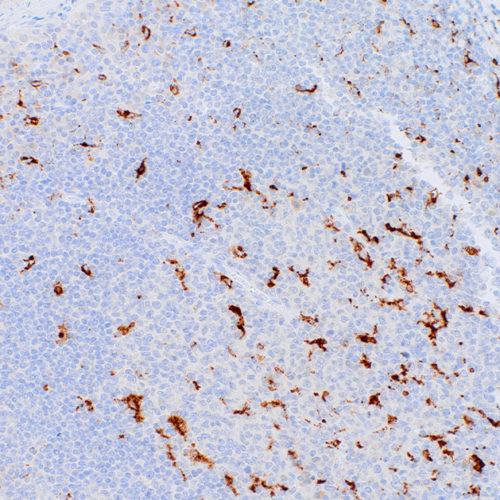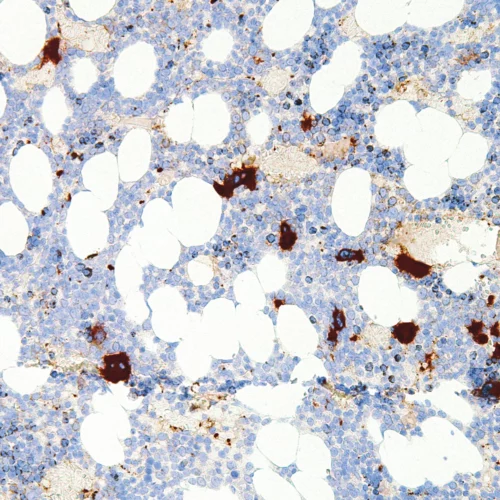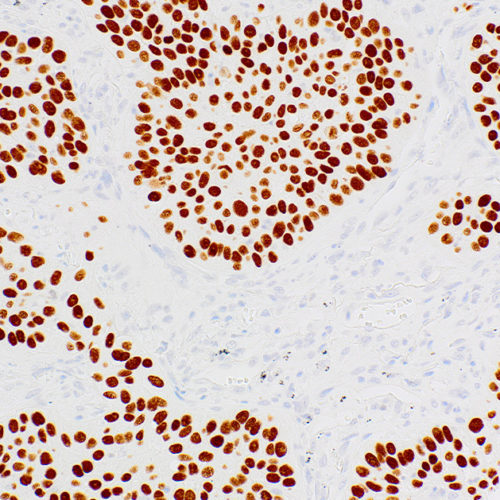High quality products to support Pathologists and Biological and Environmental Scientists
GeneAb™ LAG3
$107.50 – $489.12LAG3 (Lymphocyte-activation gene 3) was discovered in 1990 and was previously designated as CD223. LAG3 is a cell surface molecule expressed by activated T cells, natural killer cells, B cells and plasmacytoiddendritic cells. It binds to major histocompatibility complex (MHC) class II molecules and serves as an immune checkpoint receptor. LAG3 negatively regulates cellular proliferation, activation and homeostasisof T cells, and plays a role in Treg suppressive function. LAG3 also helps maintain CD8+ T cells in atolerogenic state and, working with PD-1, helps maintain CD8 exhaustion during chronic viral infection. LAG3 expression was detected in tumour infiltrating lymphocytes. IHC revealed LAG3 expression was distributed on lymphocytes scattered in renal cell carcinoma, melanoma and lymphomas. They were also detected in the tumour stroma as well as in the peritumoral tissue. LAG3 is the target of various drug development programs for cancer and autoimmune disorders. In soluble form, it is also being developed as a cancer drug in its own right.
GeneAb™ CD99
$118.25 – $682.62Cluster of Differentiation 99 (CD99) is a glycosylated transmembrane protein expressed by lymphocytes, cortical thymocytes, granulosa cells of the ovary, pancreatic islet cells, Sertoli cells, and endothelial cells. CD99 produces diffuse membrane staining patterns on nearly all Ewing’s sarcoma and primitive peripheral neuroectodermal tumours. CD99 may be found in synovial sarcoma, neuroendocrine carcinoma, acute myeloid leukemia, mesenchymal chondrosarcoma, lymphoblastic lymphoma, small round blue cell tumours, solitary fibrous tumours, vascular tumours, and myeloid sarcoma. It produces heterogeneous staining patterns which must be accompanied by other antibody staining for a final diagnosis.
GeneAb™ Desmoglein-3
$134.38 – $612.75Desmoglein-3 Antibody (DSG3) is a component of desmosomes in vertebrate epithelial cells. It identifies pulmonary squamous cell carcinomas from other types of lung cancer with high specificity and sensitivity. Studies show the upregulation of DSG3 correlated with metastasis in a number of cancers including lung cancers. The expression of DSG3 indicates a poor prognosis and portends a more aggressive clinical outcome.
GeneAb™ CD73
$241.88 – $946.00Cluster of Differentiation 73 (CD73), also known as Ecto-5′-Nucleotidase (ecto-5′-NT), is a cell surface enzyme found in most tissues. CD73 catalyzes the breakdown of AMP to adenosine, thereby modulating inflammatory and T-cell responses. Reports have implicated CD73 expression in tumour progression and carcinogenesis, as CD73 is a key regulatory molecule in the proliferation, migration, and invasion of cancer cells in vitro, as well as tumour angiogenesis and tumour immune escape in vivo. Due to this key involvement in cancer, CD73 has become an appealing target for cancer immunotherapy. CD73 expression has also been linked to favourable prognosis in breast carcinoma.
GeneAb™ CD71
$80.62 – $365.50Cluster of Differentiation 71 (CD71), also known as Transferrin Receptor Protein 1 (TfR1) or the transferrin receptor, is a cell surface proliferation marker that is involved in the cellular uptake of iron. CD71 is most highly expressed in early erythroid precursors and is fully absent from mature erythrocytes; CD71 is therefore highly useful as a marker for erythroid components within bone marrow biopsy specimens, without interference from mature erythrocytes. CD71 expression has been indicated in invasive breast carcinoma with acquired resistance to tamoxifen, and has been linked to poor prognosis in ER+/luminal-like breast cancer. Anti-CD71 is used in the determination of erythroid leukemia, benign erythroid proliferative disorders, and myelodysplastic syndrome.
GeneAb™ CD68
$86.00 – $327.88Cluster of Differentiation 68 (CD68) is a heavily glycosylated transmembrane antigen that is detected in lysosomes, tissue macrophages, Langerhans cells, dendritic cells, monocytes, Kupffer cells, osteoclasts, and granulocytes. Anti-CD68 may be useful in identifying myelomonocytic and histiocytic tumours, and for differentiating between malignant fibrous histiocytoma and other pleomorphic sarcomas. However, other lysosome-rich cells may also stain, since Anti-CD68 detects a formalin-resistant epitope that may be associated with lysosomal granules.
GeneAb™ CD61
$134.38 – $714.88Cluster of Differentiation 61 (CD61), also known as Glycoprotein IIIa or GPIIIa, is an antigen expressed on megakaryocytes, platelets, myeloid cells, monocytes, endothelial cells, smooth muscle cells, and macrophages. It is involved in platelet aggregation and acts as a receptor for fibrinogen, fibronectin, von Willebrand factor, and vitronectin. Anti-CD61 is used for identifying megakaryocytopoiesis, as seen in megakaryoblastic leukemias, myelodysplastic disorders, and acute myeloid leukemias. CD61 is also indicated as a marker for platelet adhesion in advanced atherosclerosis and has been reported in the identification of fat embolism in pulmonary tissue.
GeneAb™ p40
$155.88 – $602.00Anti-p40 recognizes squamous and basal cells, the shortest variant of p53, and ΔNp63 (an isoform of p63). p40 has been indicated as an alternative to p63 for the detection of Squamous Cell Carcinoma (SqCC), offering the advantage of eliminating potential misinterpretation of a positive adenocarcinoma as a SqCC.
